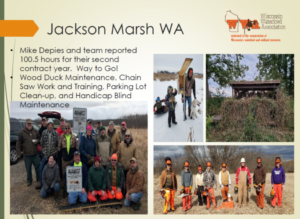 By Bruce Ross, Executive Director bruceross@wi.rr.com
By Bruce Ross, Executive Director bruceross@wi.rr.com
This article originally appeared in Wisconsin Waterfowl Association’s May, 2021 Newsletter edition.
March Madness got me thinking about sports analogies. And I thought back to the high school athlete who maybe didn’t have all the talent but made up for it in heart, commitment and team spirit. I’m thinking about the utility fielder who played where the coach needed to fill a gap; the fifth guy on the court who wasn’t the best shooter, but created opportunities for those shooters; the guy who was frequently the first on the field and last to leave. He’s the guy nicknamed “The Scrapper” or “Johnny Hustle” and who usually got the team “Energy = Impact” award at the end of the season.
I like to think WWA is that guy. We will never raise the most money in the state, restore the biggest wetlands, or spend the most dollars on duck research. But we are nimble, organized to address the complete spectrum of state waterfowling issues, and are constantly looking for opportunities to make an important “play”. We fill a critical role in Wisconsin’s duck hunting ecosystem that would otherwise go unaddressed.
One way we do that is to create opportunities for people to bring their passions and talents to that ecosystem. We are consciously structured to support volunteer efforts in areas beyond traditional fundraising (which is, of course, critical to all that we do). The 5-year success record of our Adopt-a-Wildlife Area is a great example, but there are many more. Here are just a few other habitat-focused examples:
- We know that technology will allow us to be more efficient in finding the small, restorable wetlands so important to the breeding cycle of the state’s breeding waterfowl… so we are now working with volunteers (with professional GIS credentials) to identify/develop the software tools to do just that.
- Even after remotely identifying such parcels, putting eyes on high-potential properties and engaging landowners requires on-scene presence – we are prototyping ways that committed volunteers can expand the reach of WWA’s ecologist in achieving landscape-level impacts for small-scale projects.
- A duck hunter saw that the DNR was clearcutting one of his favorite wood duck haunts and grew concerned that would lead to a loss of nesting cavities. He recently proposed a project to establish and monitor 40 wood duck boxes – his project was recently approved to move forward in this coming winter.
- WWA’s 37-year ability to restore wetlands has greatly exceeded our ability to record those successes. We are working with a professional software engineer to design and build a database to (1) more completely tell WWA’s landscape impact, and (2) help us manage the workflow that goes from project identification, through design and approval, to completion and signage.
And there are soooo many other really exciting habitat initiatives being pursued by the state Habitat Committee.
Fulfilling and leveraging volunteer interests is the role of the State-level committees. Similar volunteer-driven initiatives are being pursued in Education, Advocacy, Development, and Membership/Communications committees.
Want to play a role, but not sure where there’s the best fit? No worries! Let us know here, and we’ll help you find a way to make a difference for Wisconsin’s ducks.

